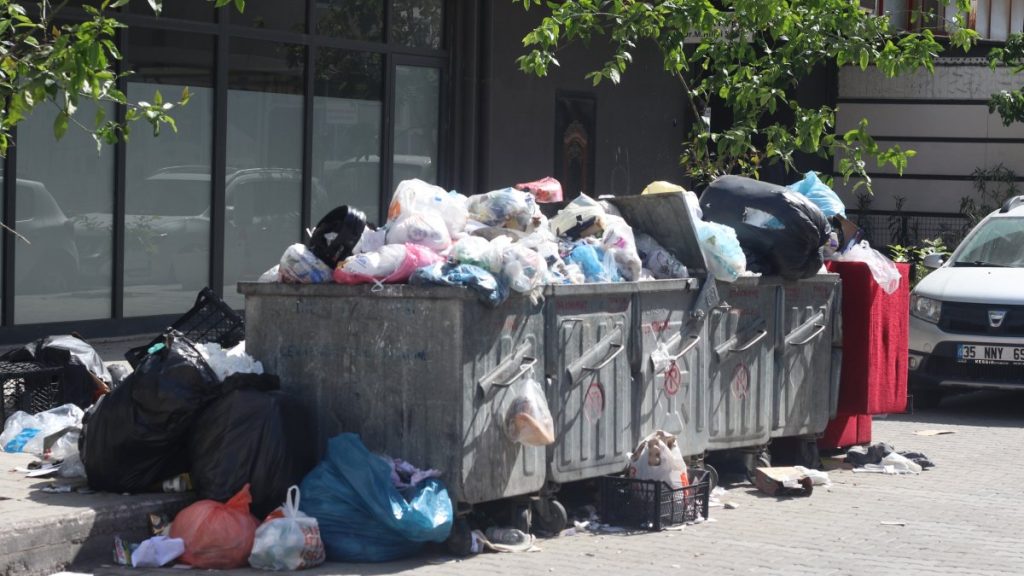Türkiye’s third-largest province, Izmir, provided unwavering support to the main opposition Republican People’s Party (CHP) for years. In return, it faces the risk of diseases. Fitting with President Recep Tayyip Erdoğan’s rhyming definition of “municipalism of garbage, cesspool, mud” (“çöp, çukur, çamur”), the CHP’s governance of the province’s districts is on the brink of collapse.
As the party fights for survival amid allegations of fraud in the 2023 intraparty election, allegations of corruption in the municipality of Istanbul and its districts, Izmir stands out as an example of municipal failures of the CHP. The CHP, for the first time in its electoral history, where it competed against the ruling Justice and Development Party (AK Party), declared victory in the 2024 municipal vote across Türkiye. But since then, Izmir’s municipalities succumbed to shortcomings, especially in terms of paying their debts.
Debts leading to the cancellation of payments to garbage workers triggered a crisis, particularly in the Çiğli district, with dumpsters overflowing with uncollected trash. Municipal workers in Karabağlar and Konak districts also seek a deal with the municipalities over unpaid wages and threaten to carry out a strike, while locals complain stench engulfing the streets of the Aegean province.
Some 1,130 workers of Çibel, a subsidiary company of the Çiğli municipality, went on a strike over the weekend when they could not reach an agreement for a salary rise with the municipality. The municipality has so far not hired any backup to collect the trash. Workers of Karabağlar and Konak municipalities threaten similar action in the coming days. The municipality of Karabağlar is mired in a debt crisis and failed to pay April salaries for workers, as well as much-anticipated bonuses for past Ramadan Bayram or Eid al-Fitr. The municipality announced a payment of a portion of unpaid salaries on Monday and the remainder in the following days. A labor union representing the workers, however, insists on full payment. In Konak, the municipality failed to reach a deal with some 1,580 workers of its subsidiary Merbel for salary raises. The union representing workers pledged a half-day strike on Tuesday while complaining that the municipality did not take their demands seriously.
Speaking to the Sabah newspaper on Sunday, Çiğli resident Selma Yolcu said the stench from the garbage uncollected for three days disturbs them. “It is a pity to go out. We can’t even open windows or doors. Çiğli does not deserve this,” she said. Kerem Topuz, another resident, warned that flies swarmed the neighborhoods as the uncollected garbage piled up. “I don’t know how long it will take. This problem should be resolved immediately,” he told Sabah. Nurgül Özmen, another resident, said that the municipality regularly collected an environmental cleaning tax from locals, but “this is what we’re facing now.” The garbage crisis also led to the cancellation of a two-day outdoor event that the municipality had planned for April 19-20 on the occasion of Children’s Day, a holiday dedicated to children by the Republic of Türkiye’s first president and CHP founder, Mustafa Kemal Atatürk.
Municipalities run by the CHP are already under fire for other problems, such as astronomical prices in mass transportation and water bills.
Some 411 municipalities run by the CHP across Türkiye have racked up a total of TL 116 billion ($3.29 billion) in debts to the Social Security Institution (SGK), a report by Sabah revealed in December. Some 1,402 municipalities in Türkiye’s 81 provinces owe a combined TL 160 billion to the SGK in premium payments, with 70% of it belonging to the CHP-run administration, Sabah wrote.
At TL 9.8 billion, Izmir tops the list of indebted city administrations run by the CHP.
Izmir is followed by the capital Ankara at TL 8.7 billion, run by Mansur Yavaş, and Istanbul at TL 6.4 billion, administered by Ekrem Imamoğlu, who was arrested last month on charges of corruption. Both mayors have governed Türkiye’s top two cities since 2019.
The debts are accrued by municipal companies, which are considered corporate bodies directly owned by the municipality.
The municipalities, per law, have been granted the right to restructure their debts for up to 120 months, including 36 months of installments for those unable to pay.
Continued negligence of the city administrations has sparked public debate over starting a confiscation procedure, which would only cover the accounts of municipal companies.
The Social Security Ministry last year blocked the deposit and corporate accounts of the metropolitan municipalities of Istanbul, Ankara, Izmir, southern Adana and Mersin, and Istanbul’s Şişli district, due to debts to the SGK.
The AK Party often accuses CHP-run municipalities of wasting their resources instead of improving public services and of economic incompetence. The opposition municipalities also faced criticism of nepotism following the 2024 local elections when it emerged that several mayors appointed their next of kin to top positions in city halls.


